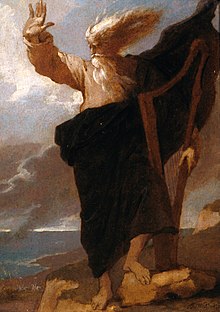
Back برد (شاعر) Arabic Bard Azerbaijani Бард BE-X-OLD Бард Bulgarian Barzh Breton Bard Catalan Bard Czech Barde (sanger) Danish Barde German Bardo Esperanto

In Celtic cultures, a bard is an oral repository and professional story teller, verse-maker, music composer, oral historian and genealogist, employed by a patron (such as a monarch or chieftain) to commemorate one or more of the patron's ancestors and to praise the patron's own activities.
With the decline of a living bardic tradition in the modern period, the term has loosened to mean a generic minstrel or author (especially a famous one). For example, William Shakespeare and Rabindranath Tagore are respectively known as "the Bard of Avon" (often simply "the Bard") and "the Bard of Bengal".[1][2] In 16th-century Scotland, it turned into a derogatory term for an itinerant musician; nonetheless it was later romanticised by Sir Walter Scott (1771–1832).[1]
- ^ a b Oxford Dictionary of English, s.v. bard, n.1.
- ^ "Work of Rabindranath Tagore celebrated in London". BBC News. Retrieved 15 July 2015.